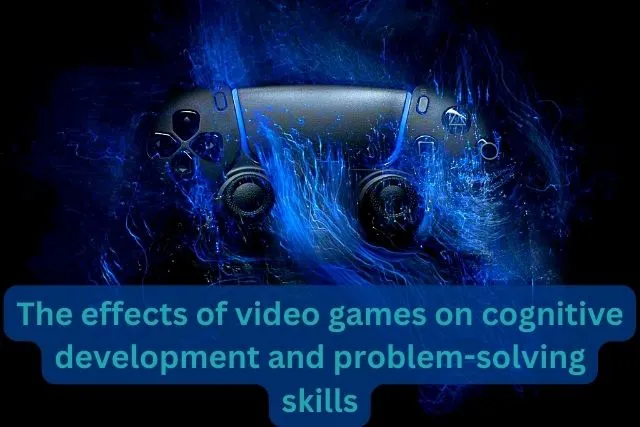Video games have become a popular form of entertainment and have a significant impact on players. They have been widely studied for their effects on cognitive development and problem-solving skills.
The effects of video games on cognitive development and problem-solving skills
While some research has shown that video games can have positive effects on cognitive development, such as improved attention and concentration, enhanced spatial reasoning, and improved decision-making and problem-solving, others have suggested that excessive use can lead to negative effects, such as reduced ability to multitask, decreased social skills, and dependence and addiction.
In this outline, we will discuss the effects of video games on cognitive development and problem-solving skills, including both the potential positive and negative effects.
Positive effects of video games on cognitive development
- Improved attention and concentration: Video games, especially action games, can improve attentional control and working memory, which can lead to better focus and concentration in other areas of life.
- Enhanced spatial reasoning: Video games that involve navigating 3D environments can improve spatial visualization and spatial reasoning skills, which are important for tasks such as math, science, and engineering.
- Improved decision-making and problem-solving: Video games can help players learn to make quick decisions and solve problems through trial and error, which can be applied to real-life situations.
- Increased creativity: Video games that require players to think outside the box, such as sandbox and open-world games, can foster creativity and imagination.
- Improved memory: Games that require players to remember certain elements, such as puzzles, can help to improve memory retention.
- Improved hand-eye coordination: Games that require players to react quickly to visual cues and control characters with a high degree of precision can improve hand-eye coordination.
- Improved multitasking abilities: Games that require players to manage multiple tasks and objectives simultaneously can help improve multitasking abilities.
Negative effects of video games on cognitive development
- Reduced ability to multitask: Spending too much time playing video games can lead to difficulty switching between tasks and focusing on multiple things at once.
- Decreased social skills: Excessive video game use can lead to decreased social skills, as players spend less time interacting with others in person.
- Dependence and addiction: Video games can be addictive and excessive use can lead to dependence and addiction, which can have negative effects on cognitive development and problem-solving skills.
- Reduced physical activity: Prolonged periods of gaming can lead to a sedentary lifestyle, which can contribute to a lack of physical activity and potential health problems.
- Reduced attention span: Excessive gaming can lead to reduced attention span, making it difficult to focus on one task for an extended period of time.
- Aggression and violence: Some studies suggest that violent video games may lead to increased aggression and desensitization to violence.
- Poor academic performance: Excessive gaming can lead to poor academic performance, as it can distract from studying and doing homework.
- Sleep disturbances: Prolonged gaming can disrupt normal sleep patterns, leading to sleep disturbances and fatigue.
- Negative impact on mental health: Prolonged gaming can have negative impact on mental health, such as depression, anxiety, and addiction.
Conclusion
In conclusion, video games can have both positive and negative effects on cognitive development and problem-solving skills. They can improve attention and concentration, enhance spatial reasoning, improve decision-making and problem-solving, and increase creativity.
However, excessive use can lead to decreased ability to multitask, reduced social skills, dependence and addiction, reduced physical activity, reduced attention span, aggression, violence, poor academic performance, sleep disturbances, and negative impact on mental health.
It’s important to note that moderation is key and players should be aware of the potential effects of video games on their cognitive development and problem-solving skills, and ensure that they balance their gaming with other activities such as physical exercise, social interactions, and education.



